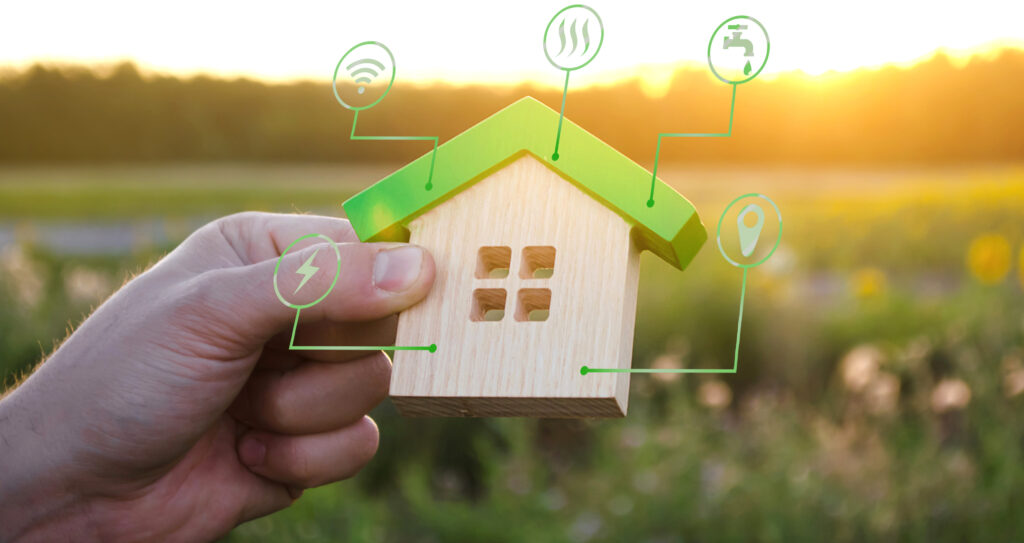With single-use plastic and CO2 emissions dominating the environmental news headlines as the biggest sources of pollution on our planet, we are all largely focused on ways in which we can do our bit to help our planet recover and renew.
There are many ways we can move towards a greener lifestyle – larger projects such as installing solar panels are one such way. But you can start smaller than that too, the little changes can add up to one big change.
In this article, we give some tips on becoming more eco-friendly in the home so that we can all do our bit for the environment.

- Reduce plastics use and recycle
With WRAP, a charity, that works with governments, businesses and citizens around the world to protect the environment, reporting that plastic packaging in the UK accounts for nearly 70% of all of our plastic waste, we should all focus on ways in which we can reduce the use of plastics.
- Why not try shopping in zero waste stores, where plastic packaging is replaced by large jars of products that you can dispense into reusable packaging to transport home. If you are unsure of where to find your nearest store, the Zero Waste Network provide this handy store finder tool.
- Shopping in your local markets and shops for fruit, vegetable, meat and baked goods allows you to take your own reusable bags and containers to transport the food home and having milk delivered in glass bottles as we did in days gone by will all help to reduce our plastic consumption.
- We know it’s difficult to remember your re-usable bags each time you go to the shops but try keeping a couple in the car or hung near the door to grab on the way out. Remember, it takes around 1000 years for each of those plastic bags to break down in landfill – a sobering thought indeed.
- Grow your own! The emissions from the supply chain network along with the unnecessary plastic used in food production can be reduced by growing your own fruit, vegetables and herbs. You don’t need acres of space either. These can be grown in pots and tubs as well as in the garden or why not approach your local council to hire an allotment? Create your own compost where possible too. Great for the garden and less waste going to landfill.
- Ditch the disposables – use washable cleaning cloths and use compostable bin liners where possible. Washable nappies and sanitary products are widely available to reduce the amount that ends up in landfill and even reusable, washable cosmetic pads are now widely available. Consider swapping hard plastic products for bamboo substitutes, items like cotton buds and toothbrushes and even children’s plates and cutlery are all now readily available in more sustainable bamboo versions.
- Water consumption
According to Friends of The Earth, each minute you spend in a power shower uses up to 17 litres of water. We all do it – run the shower a while before getting in and keep the shower running whilst we shampoo our hair and shave – but water and money are literally going down the drain. Here are a few tips to help you and your family to conserve water.
- Why not try a timer either in the shower or on your phone to keep your shower time to a minimum and save water and energy.
- A switch to an eco-friendly shower head can help too, reducing water usage.
- Running the taps whilst brushing your teeth wastes around 24 litres of water for a 2 minute brush, twice a day, so make sure you turn the tap off whilst you are cleaning your teeth.
- Many water companies offer a free, easy to fit insert for your taps to reduce water flow for efficiency.
- Whilst thinking of water consumption, only using the washing machine for a full load of clothes will use less water and energy than running 2 smaller loads.
- Try washing your clothes in cold water – it gets the clothes just as clean as hot but in a more efficient way. According to Energy Star, up to 90% of the electricity used by a washing machine is used by heating the water.
- Consider your energy use and install a Smart Meter
Installing a Smart Meter to measure how much gas and electricity you’re using gives you control over the small changes you can make to make your home more energy efficient and do your bit to help the environment. Those little changes soon add up! You could:
- Turn off lights in rooms you aren’t using
- Switch to energy efficient lightbulbs – each one could save you £10 per year off your electricity bill!
- Switch appliances off fully rather than use ‘Standby’ mode and unplug chargers not in use so electricity isn’t being drained unnecessarily
- Hang clothes to dry rather than use the tumble dryer
- Make energy efficient choices when buying new appliances – try to buy appliances with the best energy ratings, which for most large appliances is an A rating.
We hope these simply tips inspire you and your family to become more eco-friendly. These small changes, if we all do them, will have a huge impact!






